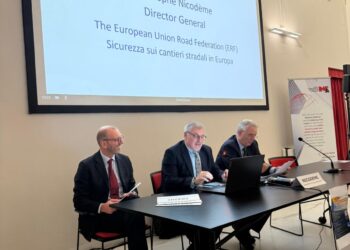Brussels | 3 June 2021
On June 3rd, the ERF participated at the PIARC webinar on “Impacts of Covid on road projects: financing, procurement, transparency and due diligence”.
Simon Gianordoli, ERF Policy and Project Officer, presented the insights of the upcoming report “Mobility and Recovery in Europe: Impacts of the Covid-19 crisis” to be published next July on behalf of the six organisations responsible for the benchmark ERF, Routes de France, French Federation for Public Works, Confederation of International Contractors’ Associations, and the European Construction Industry Federation).
Considering the severe covid-19 crisis impact on transport and mobility sectors, the working group analysed mobility trends and changes before and during the crisis. Another important element of the report focuses on the consideration of transport, specifically road infrastructure, into National Recovery and Resilience Plans in 10 EU countries (i.e. Spain, France, Italy, Germany, Belgium, the Netherlands, Poland, Czech Republic, Sweden, Croatia) plus the United Kingdom.
Results of the first comparison between national recovery plans unveil that transport is well covered by EU countries being considered as an important channel for investments and reforms. It clearly aligns to reduction of emissions in the transport sector and climate objectives.
However, the main part of funding is allocated to the rail sector and rail infrastructure as for example in Italy (€25 billion) or in France (more than 50% of the transport envelope) prioritising the modal shift from road to rail. In this sense, road infrastructure is generally not covered by the national recovery plans. Climate investments in road transport are mainly targeted through the greening of vehicle fleets with charging infrastructure deployment without considering the road itself. On the contrary, Central Europe countries such as Czech Republic are focussing their plans on the infrastructure where the road networks play a key role. In addition, it must be noted that road infrastructure policies are already existing before the crisis as in Germany. In this case, many countries are proposing new simplified rules and procedures for public procurement in order to accelerate construction projects execution.
Nevertheless, daily mobility relies much more on road infrastructure. Concretely, at EU level more than 80% of passenger’s transport and more than 70% of freight transport use the road. Even if promoting a stronger rail transport offer and greening car fleets brings a clear opportunity to achieve ambitious climate objectives, road transport is likely to remain the dominant mode in the coming years being key to integrate other modes of transport.
During the PIARC webinar, the ERF recalled the importance if the road infrastructure as the first social network in terms of mobility. The sector proved its flexibility and adaptability during first waves of the Covid-19 pandemic through new speed limits in large urban areas, and tactical urbanism measures through temporary and definitive cycling paths and traffic regulation measures. In the same path, the transport of goods (medicines, health care products, food supplies, etc) has been almost totally ensured from the road sector during the peak moment last spring in 2020. Road infrastructure is a massive economic and social asset that needs to be properly funded, maintained, and repaired in accordance with its role.
The working group will issue the complete report shortly with a set of recommendations.
-
Safer, Smarter Roads Discussed at the 25th Belgian Road Congress
October 10, 2025 -
ERF calls for Smarter, Safer Road Work Zones at Bologna Forum
October 9, 2025




